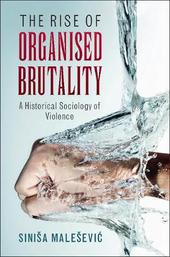
|
The Rise of Organised Brutality: A Historical Sociology of Violence
Paperback / softback
Main Details
| Title |
The Rise of Organised Brutality: A Historical Sociology of Violence
|
| Authors and Contributors |
By (author) Sinisa Malesevic
|
| Physical Properties |
| Format:Paperback / softback | | Pages:346 | | Dimensions(mm): Height 228,Width 152 |
|
| Category/Genre | World history |
|---|
| ISBN/Barcode |
9781107479494
|
| Classifications | Dewey:306.609 |
|---|
| Audience | | Professional & Vocational | |
|---|
|
Publishing Details |
| Publisher |
Cambridge University Press
|
| Imprint |
Cambridge University Press
|
| Publication Date |
3 April 2017 |
| Publication Country |
United Kingdom
|
Description
Challenging the prevailing belief that organised violence is experiencing historically continuous decline, this book provides an in-depth sociological analysis that shows organised violence is, in fact, on the rise. Malesevic demonstrates that violence is determined by organisational capacity, ideological penetration and micro-solidarity, rather than biological tendencies, meaning that despite pre-modern societies being exposed to spectacles of cruelty and torture, such societies had no organisational means to systematically slaughter millions of individuals. Malesevic suggests that violence should not be analysed as just an event or process, but also via changing perceptions of those events and processes, and by linking this to broader social transformations on the inter-polity and inter-group levels he makes his key argument that organised violence has proliferated. Focusing on wars, revolutions, genocides and terrorism, this book shows how modern social organisations utilise ideology and micro-solidarity to mobilise public support for mass scale violence.
Author Biography
Sinisa Malesevic is a Professor of Sociology at University College Dublin. His books include Nation-States and Nationalisms: Organisation, Ideology and Solidarity (2013), The Sociology of War and Violence (Cambridge, 2006), Identity as Ideology (2006), The Sociology of Ethnicity (2004) and the edited volumes Ernest Gellner and Historical Sociology (2015), Nationalism and War (Cambridge, 2013) and Ernest Gellner and Contemporary Social Thought (Cambridge, 2007). His work has been translated into Croatian, Persian, Turkish, Portuguese, Russian, Serbian and Spanish.
Reviews'This is an extremely important book - proving against naive recent contentions that modernity and violence go hand-in-hand. It is empirically and theoretically sophisticated, and elegant and lucid as well.' John Anthony Hall, McGill University, Montreal 'In this book Sinisa Malesevic brings together disparate phenomena - wars, revolutions, genocides, terrorisms - in a compelling historical narrative about the role of organised violence in modern society. Essential reading for all concerned with this fundamental problem.' Martin Shaw, Institut Barcelona d'Estudis Internacionals and Roehampton University, London '... important and informative ...' Anthropology Review Database 'Among academics and the wider public, the progressive development of human society is widely understood to make violence and brutality one day obsolete. The publication of Sinisa Malesevic's new book provides an opportunity to reflect on the prevailing orthodoxy that civilization and violence are mutually exclusive phenomena.' Babak Mohammadzadeh, Global Affairs 'For those who believe that sociology can and should serve to increase our knowledge regarding these important topics, it must be said that the volume under review - The Rise of Organised Brutality - succeeds admirably.' Ilmari Kaihkoe, Journal of Political Power 'Sinisa Malesevic has written a wide-ranging and compelling overview of organized violence. It combines a macrohistorical approach, comparing violence from the time humans were nomadic foragers up to the present, with an explanation of mechanisms of 'microsolidarity' that allow people to overcome inherent inhibitions against killing fellow human beings ... The Rise of Organised Brutality is a valuable and erudite contribution to a lively and important debate.' Journal of Peace Research 'The book is an excellent example of an insightful historical sociological analysis that highlights the need for further empirical research of organised violence.' Andrej Cvetic, Journal of Regional Security
|